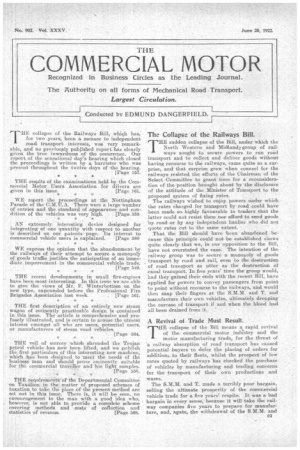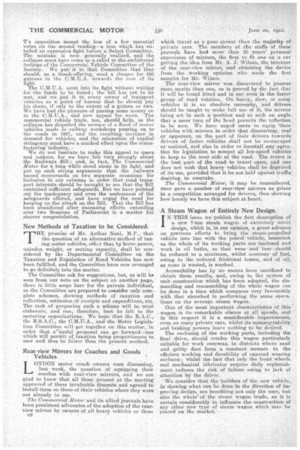The Collapse of the Railways Bill.
Page 1

Page 2

If you've noticed an error in this article please click here to report it so we can fix it.
THE sudden collapse of the Bill, under which the North Western and Miciland.r. group of railways sought to secure powers to run road transport and to collect and deliver goods without having recourse to the railways, came quite as a auxprise, and that surprise grew when counsel for the railways resisted the efforts of the Chairman of the Select Committee to grant time for a reconsideration of the position brought about by the disclosure of the attitude of the Minister of Transport to the proposed system of fixing rates.
The railways wished to enjoy powers under which therates charged for transport by road could have been made so. highly favourable to traders that the latter could not resist them nor afford to send goods by. road or by any independent haulier who did not quote rates cut to the same extent.
That the Bill should have been abandoned because this principle could not be established shows quite clearly that we, in our opposition to the Bill, have not overstated the case. The intention of the railway group was to secure a monopoly of goods ., transport by road and rail, even to the destruction of road transport as utter as the destruction of canal transport. In five years' time the. group would, had they gained their ends with the recent Bill, have applied for powers to convey passengers from point to point without recourse to the railways, and would then snap their fingers at the S.M.M. and T. and manufacture their own vehicles, ultimately dropping the carcase of transport if and when the blood had
all been drained from it.
A Revival of Trade Must Result.
THE collapse of the Bill means a rapid revival of the commercial motor industry and the motor manufacturing trade, for the threat of a railway absorption of road transport has caused potential buyers to defer the placing of orders for additionb to their fleets, whilst the prospect of low rates quoted by railways has ehecked the purchase of vehicles by manufacturing and trading concerns for the transport of their own productions and wares.
The S.M.M. and T. made a terribly poor bargain, selling the ultimate prosperity of the commercial vehicle trade for a five years' respite. It was a. bad bargain in every sense, because it will take the railway companies five years to prepare for manufacture, and, again, the withdrawal of the S.M.M. and
T's opposition meant the lots of a few essential votes on the second reading—a loss which has entailed an expensive fight before a Select Committee. The mistake is now generally realized, and the collapse must have come as a relief to the embittered feelings-of the Commercial Vehicle Committee of the Society. We putrit. to that Committee that they should, as a thank-offering' send a cheque for 250 guineas to the C.M.U.A. towards the eost of its fight.
The C.M.TJ.A. went into its fight without waiting -for the funds to be found; the bill has yet to be met, and we put it to every owner of transport vehicles as a point of honour that he should pay his share, if only to the extent of aguinea or two. We have had the pleasure.of passing some money on to the C.M.U.A. and now appeal for more. The commercial vehicle trade, too, should help, as the collapse has dispelled the menace of a flood of motor vehicles made in railway workshops pouring on to the roads in 1927, and the resulting increase' in demand for vehicles, and the relaxation of capital stringency must have a marked effect upon the manufacturing industry..'
We do not hesitate to make this appeal to users and makers, for we have felt very strongly about the Railways Bill ; and, in fact, The Commercial Motor for a long while stood alone in its fight, and put up such strong arguments that the railways issued memoranda on two separate occasions for inclusion in our columns in order that road transport interests should be brought to see that the Bill contained sufficient safeguards. But we have pointed out the inadequacy and even the uselessness of the safeguards offered, and have urged the need for keeping up the attack on the Bill. That the Bill-has been abandoned after unceasing efforts extending over two Sessions of Parliament is a matter for sincere congratulation.
New Methods of Taxation to be Considered.
THE. promise of Mr. Arthur Neal, M.P., that the question of an alternative method of taxing motor vehicles, other than by horse-power, unladen weight, or seating capacity, shall be considered by the Departmental Committee on the Taxation and Regulation of Road Vehicles has now been fulfilled, and the Committee have now arranged
to go definitely into the matter. , The Committee ask for suggestions, but, as will be seen from our note on the subject on another page, there is scope here for the private individual, as the Committee are prepared to consider only complete schemes, showing methods of axation and collection, estimates of receipts and expenditure, etc. The task of preparing such a scheme will be most elaborate, and can, therefore, best be left to the motoring organizations. We hope that the R.A.C., the R.S.A.C., the C.M.U.A., and the Motor Legislation Conimittee will get together on this matter, in order that eliseful proposal can go forward—one which will permit of taxation being proportionate to user and thus be fairer than the present method.
Rear-view Mirrors for Coaches and Goods Vehicles. .
LNDON motor coach owners were discussing, Olast weak, the question of equipping their coaches with rear-view mirrors, and we are glad to know that all those present at the meeting approved of these invaluable fitments and agreed to install them on those of their vehicles where they were not already in use.
The Commercial _Motor and its allied journals have been persistent advocates of the adoption of the rearview mirror by owners of all heavy vehicles or those
ca..
which travel at a pace slower than the majority of private ears. The members of the staffs of those journals have had more than 20 years' personal experience of mirrors, the first to fit one on a car getting the idea from Mr. A. J. Wilson, the inventor of the rear-view mirror, and obtaining the device from the Working optician who made the first samples for Mr. Wilson.
The rear-view mirror was discovered to possess more merits than one, as is proved by the fact thatit will be found fitted and in use even in the faster group of' road vehicleea On heavy, slow, or noisy vehicles it is an absolute necessity, and drivers should be taught to make full use of it, the mirror being set in such a position and at such an angle that a mere turn of the head permits the reflection to be seen. We have urged users to equip their vehicles with mirrors in order that discourtesy, real or apparent, on the part of their drivers towards drivers of faster vehieles shall not he encouraged or assisted, and also in order to forestall any agitation for legislation to eompel all low-speed vehicles to keep to the near side of the road. The crown is the best part of the road to travel upon, and one does not wish that heavy vehicles shall be deprived of its use, provided that it be not held against traffie desiring to overtake.
The Commercial Motor, it may be remembered, once gave a number of rear-view mirrors as prizes in a competition arranged for drivers, thus showing how keenly we have this subject at heart..
A Steam Wagon of Entirely 'New Design.
IN THIS issue we publish the first description of a new 7-ton steam n wagon of extremely novel design, which is, in our opinion, a great advance on previous 'efforts to bring the steam-propelled vehicle into line with the petrol vehicle, inasmuch as the whole of its working parts are enclosed and work in oil baths, so that wear and tear should be reduced to a minimum, whilst economy of fuel, owing to the reduced frictional losses,_ and of oil, as none is wasted, is marked.
Accessibility has by no means been sacrificed to obtain these results, and, owing to the system of unit construction which has been adopted, the dismantling and reassembling of the whole wagon can be done in a time which compares very favourably with that absorbed in performing the same operations on the average steam wagon.
One of the most important characteristics of this wagon is its remarkable silence at all speeds, and in this respect it is a considerable improvement, even on many private cars, whilst its manoeuvrability and braking powers leave nothing to be desired.
The enclosing of the working parts, including the final drive, should render this wagon particularly suitable for work overseas, in districts where sand and gritty dust form. a constant menace to the efficient working and durability of exposed wearing surfaces; whilst the fact that only the front wheels arid mechanical lubricator require daily replenish/3:tent reduces the risk of failure owing to lack of attention by the driver.
We consider that the builders of the new vehicle, in showing what can be done in the direction of improving design, are benefiting not only the user, but also the whole." of the steam wagon trade, as it is certain considerably to influence the construction of any other new type of steam wagon which may be placed on the market.
































